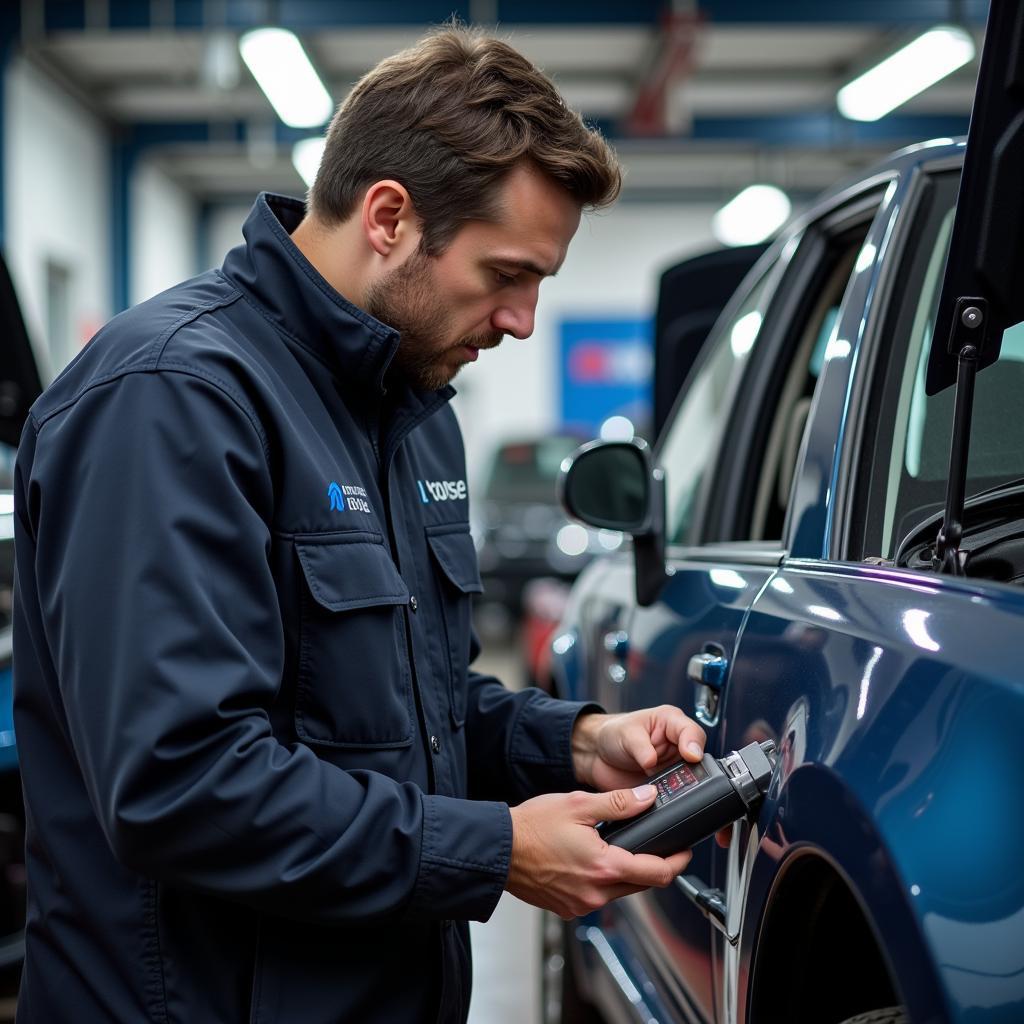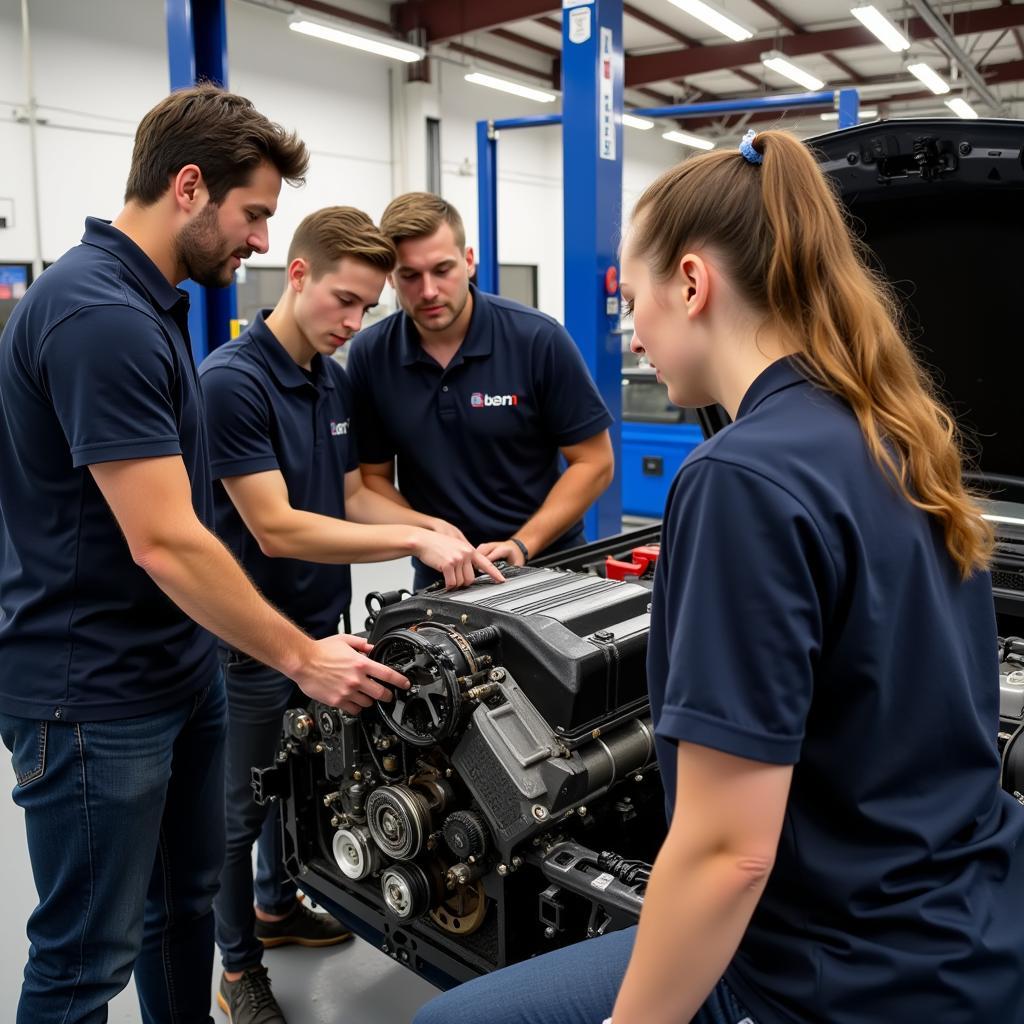Want to turn your passion for cars into a rewarding career? Becoming a car diagnostic technician might be the perfect path for you. As vehicles become increasingly complex, skilled technicians are in high demand to diagnose and repair the sophisticated systems that keep cars running smoothly. This guide will provide a comprehensive roadmap on how to join this exciting and ever-evolving field.
Understanding the Role of a Car Diagnostic Technician
Car diagnostic technicians are the detectives of the automotive world. They use their knowledge of mechanical, electrical, and electronic systems to identify the root cause of vehicle issues. Their work goes beyond just fixing the obvious; they delve into the car’s computer system, using sophisticated diagnostic tools to interpret data and pinpoint problems.
 Car diagnostic technician using a scanner on a vehicle
Car diagnostic technician using a scanner on a vehicle
Essential Skills for a Successful Car Diagnostic Technician
While a passion for cars is a great starting point, thriving in this profession requires a specific set of skills and aptitudes:
- Technical Expertise: A strong foundation in automotive technology, including engines, transmissions, brakes, steering, suspension, electrical systems, and electronics, is crucial.
- Analytical Thinking: Diagnostic technicians need to analyze data from various sources, including diagnostic tools and customer descriptions, to identify the root cause of problems.
- Problem-Solving Skills: The ability to approach problems systematically, troubleshoot effectively, and develop solutions is key to success in this field.
- Computer Literacy: Modern vehicles are heavily reliant on computer systems. Proficiency with diagnostic software, digital multimeters, and other computer-based tools is essential.
- Communication Skills: Clearly explaining technical issues to customers and providing repair recommendations in a way they can understand is crucial for building trust and ensuring satisfaction.
Steps to Become a Car Diagnostic Technician
Here’s a step-by-step guide to help you navigate your journey:
- Obtain a High School Diploma or Equivalent: A high school education provides the basic foundation for further learning.
- Consider Post-Secondary Education: While not always mandatory, completing a certificate program or an associate’s degree in automotive technology from a vocational school or community college can give you a competitive edge.
- These programs provide in-depth knowledge of automotive systems, hands-on experience, and often prepare you for industry certifications.
- Gain Practical Experience:
- Apprenticeships: Seeking an apprenticeship at a repair shop or dealership allows you to learn from experienced technicians while earning a wage.
- Entry-level positions: Starting in positions like a lube technician or automotive service writer can provide valuable experience and exposure to the industry.
- Get Certified: Earning industry certifications demonstrates your competence and commitment to professional development.
- ASE Certification: The National Institute for Automotive Service Excellence (ASE) offers various certifications, including ones specifically for car diagnostics. These certifications are highly respected in the industry.
- Continuing Education: The automotive industry is constantly evolving with new technologies emerging regularly. Engaging in continuous learning through workshops, online courses, and industry publications is crucial for staying updated and advancing your career.
 Students working on a car engine in an automotive training program
Students working on a car engine in an automotive training program
Finding Your First Car Diagnostic Technician Job
- Networking: Attend industry events, connect with professionals on LinkedIn, and reach out to local repair shops and dealerships.
- Online Job Boards: Websites like Indeed, Monster, and CareerBuilder often list car diagnostic technician positions.
- Company Websites: Check the careers sections of dealerships, repair chains, and automotive companies.
Salary Expectations and Career Growth
The salary of a car diagnostic technician can vary depending on location, experience, certifications, and the type of employer. According to the U.S. Bureau of Labor Statistics, the median annual salary for automotive service technicians and mechanics, which includes diagnostic technicians, was $46,880 in May 2020.
With experience, expertise, and further certifications, you can advance to roles like master technician, shop foreman, or even open your own repair business.
Frequently Asked Questions (FAQ)
-
How long does it take to become a car diagnostic technician? The timeframe varies, but it typically takes 2-4 years to acquire the necessary education and experience.
-
Is a college degree required to be a car diagnostic technician? While not always mandatory, a certificate program or associate’s degree can significantly enhance your job prospects and earning potential.
-
What are some common car diagnostic tools? Some essential tools include OBD-II scanners, multimeters, oscilloscopes, and pressure gauges.
-
What are some resources for finding automotive training programs? You can find reputable programs through community colleges, vocational schools, and industry organizations like ASE.
-
Is being a car diagnostic technician physically demanding? The job can be physically demanding at times, requiring lifting, bending, and working in potentially awkward positions.
Are you ready to launch a rewarding career diagnosing and repairing the cars of tomorrow? Contact us on WhatsApp: +1(641)206-8880, Email: [email protected]. Our dedicated team is available 24/7 to answer your queries and guide you on your journey to becoming a skilled car diagnostic technician.

Leave a Reply